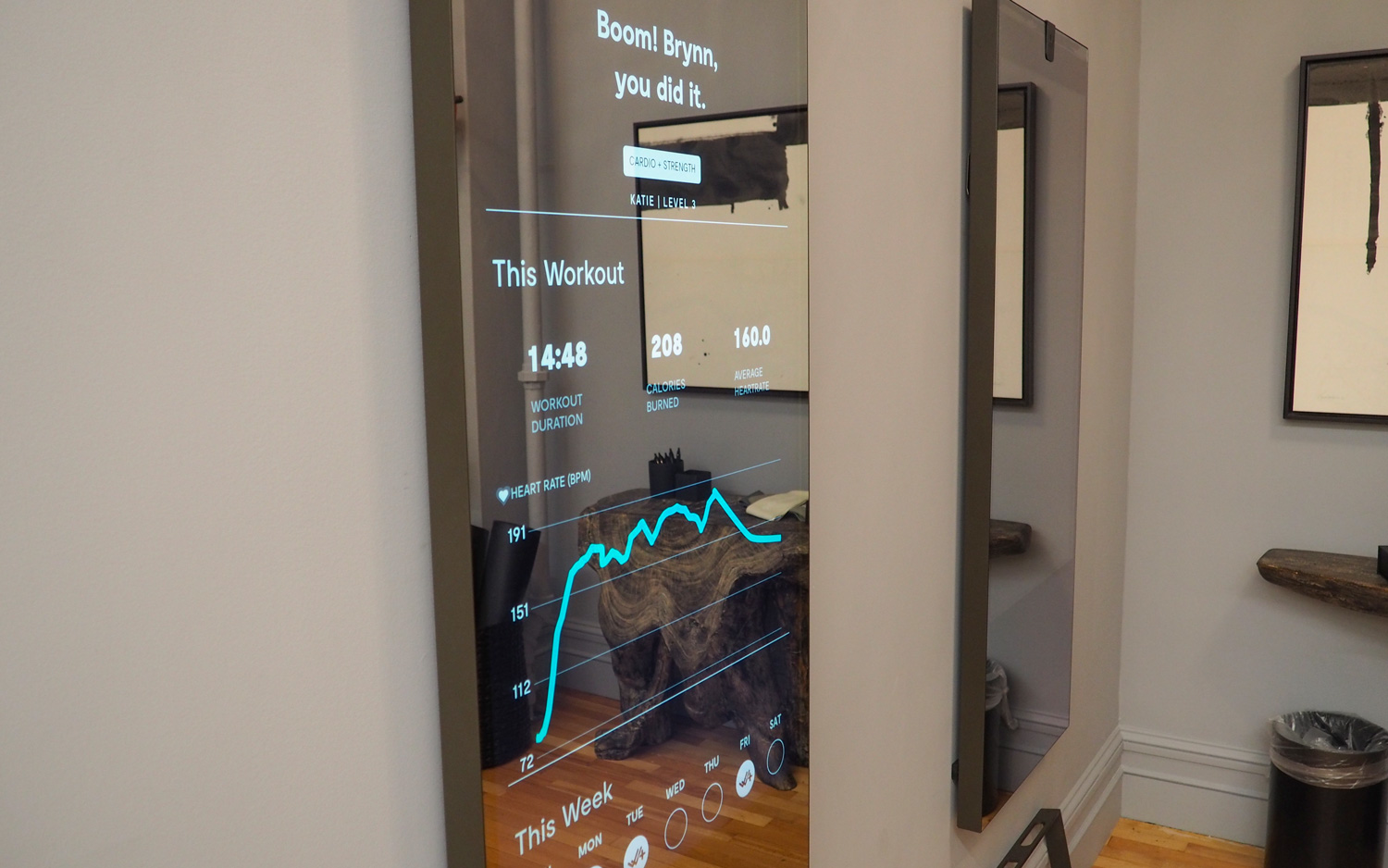This $1,500 Smart Mirror Is Peleton's Newest Rival
A new full-length mirror doubles as a display for streaming workouts taught by Mirror’s instructors in the company’s Manhattan studio.
I’ve always wanted to splurge on a piece of gym equipment for my house, but I have nowhere to store a stationary bike or treadmill. What if a workout machine could be disguised as a piece of decor?

That’s where the $1,495 Mirror, available to buy now, comes in. As you might have guessed, it’s a mirror — a full-length one that doubles as a 1080p LCD display for streaming live and on-demand workouts taught by Mirror’s instructors in the company’s Manhattan studio.
Seeing the Mirror in person is strange, at first, because the device is both a mirror and a screen. Brynn Putnam, the company’s founder and CEO, said Mirror is made of custom glass so that people can watch themselves and correct their form while also following along with the instructor, just like they would in a boutique workout class.
“Visualization of yourself in the mirror is motivation,” Putnam said during a demo of the device at the company’s studio.

Mirror syncs with a smartphone app, where you choose from a variety of workout classes including cardio, strength-training, barre, Pilates and more. The classes range from quick 15-minute stretch sessions to intense 60-minute workouts. Mirror also syncs with Bluetooth heart rate monitors, including the Apple Watch, so the instructors can see your stats in real-time on-screen and offer tailored advice or encouragement. A heart rate monitor is also included in the box if you don’t already use one.
MORE: The Doctor on Your Wrist: How Smartwatches Are Saving Lives
As you watch the instructor move through the exercise sequence, you can watch your heart rate climb on the display. The mirror also shows your heart rate data’s relationship to target heart rate zones, so you can push yourself harder or lighten up to reach the optimal zone.
Sign up to get the BEST of Tom's Guide direct to your inbox.
Get instant access to breaking news, the hottest reviews, great deals and helpful tips.
Personal training will also be available — Mirror has built-in stereo speakers and a camera so you can get more hands-on instruction. Yes, the camera has a lens cap for privacy.
Like Peloton and other companies that offer home gym equipment with a video-on-demand component, Mirror has a high up-front price tag and a $39 monthly subscription fee to access the classes. A Peloton bike is $2,245 up-front and $39/month for the subscription. But Putnam says Mirror is three things in one: a piece of gym equipment, a high-end floor-length mirror (which could cost hundreds of dollars for something on the nicer side from Crate and Barrel) and a replacement for a boutique fitness classes. People spend $100 a month on average for a studio membership. In New York, a ClassPass subscription for 100 classes costs $160 a month.

Mirror isn’t actually a machine, though. Equipment from Peloton, NordicTrack and others can be used as bikes, treadmills, etc. without the streaming component. But buying a workout machine at that price isn’t so much about the equipment itself as about taking classes live or on-demand, seeing metrics and progress, and competing against classmates. In that sense, Mirror is like Peloton but with more flexibility in the kinds of workouts you can do.
“We’re not trying to be the next treadmill in your home,” Putnam said. “We want to be the next screen in your life.”
MORE: Best Fitness Apps
YouTube workout videos are free, but trying to follow an instructor on a smartphone or tablet screen isn’t the same as taking a class in person. Mirror isn’t exactly the same, either, but it’s closer.
When I watched a Mirror class streaming to the display during my demo, I could see myself streaming classes regularly. I already cancelled my ClassPass membership because the price kept increasing. A device that does double duty as both a workout machine and a decorative item in my apartment would be much more useful to me than a piece of gym equipment. When iPhones cost $1,000, a $1,500 fitness-focused device that also looks good on my wall suddenly doesn’t sound so crazy.
Caitlin is a Senior editor for Gizmodo. She has also worked on Tom's Guide, Macworld, PCWorld and the Las Vegas Review-Journal. When she's not testing out the latest devices, you can find her running around the streets of Los Angeles, putting in morning miles or searching for the best tacos.
